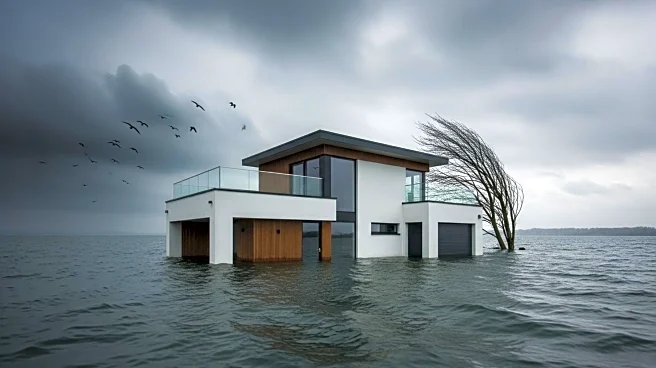What is the story about?
What's Happening?
A report by First Street, a climate risk financial modeling company, has highlighted the potential impact of climate change on the U.S. housing market. The report suggests that human-amplified climate change could lead to a $1.47 trillion loss in housing market value by 2055. This decline is attributed to extreme weather events exacerbated by climate change, affecting 85% of U.S. neighborhoods due to insurance pressures and shifting consumer demand. The report notes that insurance costs are rising significantly faster than mortgage payments, with insurance rates increasing from 7-8% to over 20% of mortgage costs between 2013 and 2022. Sun Belt states, including Texas, Florida, and California, are identified as being at the highest risk of climate-related housing devaluation.
Why It's Important?
The findings of the First Street report underscore a significant shift in the real estate market, where traditional factors such as location and amenities are being overshadowed by environmental vulnerabilities. The potential devaluation of housing due to climate risks could have widespread economic implications, affecting homeowners, insurers, and the broader real estate market. States like Texas, Florida, and California, which have absorbed a substantial portion of U.S. disaster costs since 1980, may face increased insurance premiums and reduced property values. This could lead to a decrease in consumer demand for homes in high-risk areas, impacting local economies and community investments.
What's Next?
The report suggests that potential buyers may become more cautious about purchasing homes in areas prone to climate-related risks, which could further drive down property values. As insurance companies adjust premiums to reflect actual risks, homeowners may face higher costs, prompting a reevaluation of housing investments. Policymakers and community leaders may need to consider strategies to mitigate climate risks and support affected communities. The real estate industry might also need to adapt by incorporating climate risk assessments into property valuations and investment decisions.
Beyond the Headlines
The report highlights a broader cultural and ethical shift in how Americans perceive housing and community investments. As environmental vulnerabilities become more prominent, there may be increased pressure on policymakers to address climate change and its impact on the housing market. This could lead to new regulations and incentives aimed at promoting sustainable development and reducing carbon footprints. Additionally, the insurance industry may face challenges in balancing profitability with the need to provide affordable coverage in high-risk areas.


















